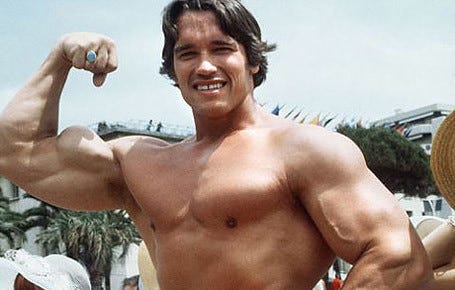Pumping Iron

It is more interesting to talk about "Pumping Iron" than watch the movie, although as documentaries go, it's not bad. Make that "docu-drama," for in subsequent revelations about the 1977 movie that propelled the fortunes of Arnold Schwarzenegger in particular and weight lifting in general, its participants cheerfully admit that most of the film is fake.
Well, the intense training is real, as is the competition, such as it is. Although I must confess I am one of those people with a very narrow definition of what constitutes a sport. Basically, my rules are that a game must be won by objective criteria only -- most points scored, fastest time, etc. Anything where you go out and do your thing, and then after you're done some judges tell you how well you did, is by definition subjective and therefore not a sport. That knocks out about half the Olympic events.
But anyway, what I mean is that the 1975 Mr. Olympia and Mr. Universe contests were not rigged, and therefore are real as depicted in "Pumping Iron." But virtually all the drama about Schwarzenegger as the playful, egotistic champion vying against the humble upstart, Lou Ferrigno, was brazenly manufactured in order to make the story more interesting, and therefore garner enough attention from financial backers to complete filming.
In the making-of documentary included with the film's 25th anniversary DVD, Schwarzenegger confesses that he was never worried about Ferrigno, who didn't even come in second. Schwarzenegger won his sixth consecutive Mr. Olympia title handily, and promptly retired from professional bodybuilding to pursue a career in Hollywood. Ferrigno went on to his own slice of fame as TV's Incredible Hulk.
Schwarzenegger also reveals that he lied about skipping his own father's funeral to train for a competition, and myriad other things he says or does in "Pumping Iron," simply to build up his persona. It's even revealed that Schwarzenegger intended to retire after his fifth Mr. Olympia title, and only went for a sixth so he could star in the movie.
Similarly, a lot of the other little conflicts in the movie were engineered by filmmakers George Butler and Robert Fiore, including the theft of a contestant's T-shirt by a competitor in order to psyche him out. Although how these hulking giants, who must go through shirts like dental floss, could be so upset about a missing T-shirt as to throw off their performance is beyond me.
I don't necessarily blame Butler and Fiore. The film is only about 84 minutes long, and as Schwarzenegger himself says, if all you had was footage of them lifting weights and posing, it would get very boring rather quickly.
Still, "Pumping Iron" is a watershed in filmmaking because it not only shined a spotlight on the weird little subculture of bodybuilding, but actually made it acceptable for mainstream society. Suddenly, action movie stars all had to be bulging with inflated muscles.
Now to bodybuilding itself.
I have always considered bodybuilding ridiculous, puzzling, and harmful. Watching the movie, we are presented with a group of men whose most ardent passion is watching themselves in the mirror. They lift weights not to grow stronger, but to look stronger. Take a look at the bodies of Olympic weightlifters, and you'll see they bear little resemblance to the tanned, swollen limbs and torsos popping with veins of the bodybuilders.
Then there's the posing. They practice for endless hours in the mirror, smearing oil on their bodies and tanning in the sun. Then they gather together for a flex-off.
A sport? This is narcissism organized into competitiveness -- two of the worst traits of masculinity.
4 Yaps

